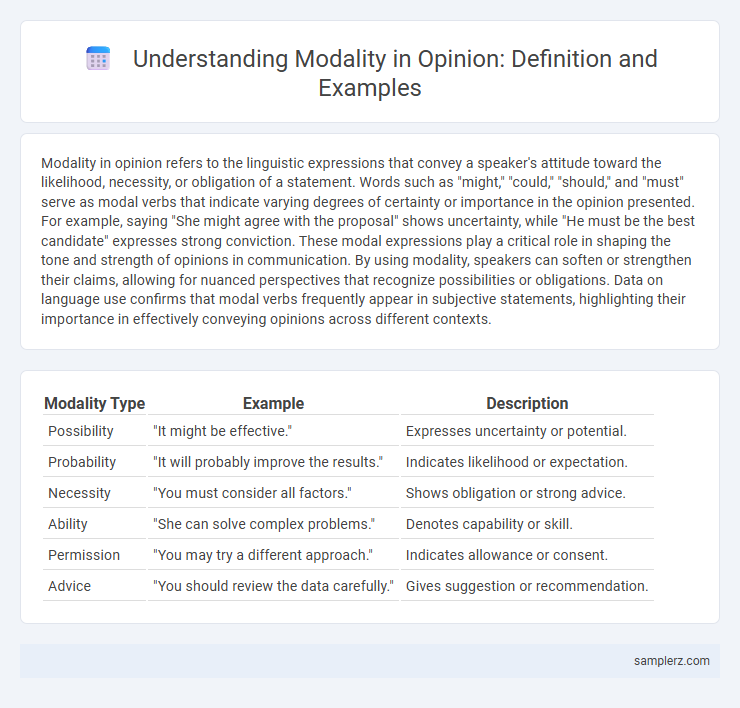Modality in opinion refers to the linguistic expressions that convey a speaker's attitude toward the likelihood, necessity, or obligation of a statement. Words such as "might," "could," "should," and "must" serve as modal verbs that indicate varying degrees of certainty or importance in the opinion presented. For example, saying "She might agree with the proposal" shows uncertainty, while "He must be the best candidate" expresses strong conviction. These modal expressions play a critical role in shaping the tone and strength of opinions in communication. By using modality, speakers can soften or strengthen their claims, allowing for nuanced perspectives that recognize possibilities or obligations. Data on language use confirms that modal verbs frequently appear in subjective statements, highlighting their importance in effectively conveying opinions across different contexts.
Table of Comparison
| Modality Type | Example | Description |
|---|---|---|
| Possibility | "It might be effective." | Expresses uncertainty or potential. |
| Probability | "It will probably improve the results." | Indicates likelihood or expectation. |
| Necessity | "You must consider all factors." | Shows obligation or strong advice. |
| Ability | "She can solve complex problems." | Denotes capability or skill. |
| Permission | "You may try a different approach." | Indicates allowance or consent. |
| Advice | "You should review the data carefully." | Gives suggestion or recommendation. |
Understanding Modality in Expressing Opinions
Modality in expressing opinions often involves modal verbs like "might," "could," and "should" to indicate possibility, permission, or obligation, shaping the strength and nuance of the viewpoint. Understanding modality enables clearer communication of uncertainty, probability, or necessity in personal judgments. This linguistic feature helps distinguish between facts and subjective interpretations, enhancing the precision of opinion statements.
Key Modal Verbs Used for Opinions
Key modal verbs used for expressing opinions include "should," "must," and "might," which convey varying degrees of certainty and recommendation. For instance, "should" suggests a strong recommendation, "must" indicates an obligation or necessity, while "might" expresses possibility or uncertainty. These modals help articulate subjective viewpoints clearly and persuasively in both spoken and written communication.
High vs. Low Modality in Opinion Statements
High modality in opinion statements uses assertive language such as "definitely," "must," or "is essential," conveying strong certainty and confidence in the expressed viewpoint. Low modality employs softer expressions like "might," "could," or "seems," indicating uncertainty or openness to alternative perspectives. Understanding the distinction between high and low modality helps in identifying the speaker's level of conviction and the strength of their argument.
Modal Expressions for Certainty and Doubt
Modal expressions like "must," "might," and "could" effectively convey varying degrees of certainty and doubt in opinions. "Must" signals strong certainty about a conclusion, while "might" and "could" introduce possibilities and emphasize uncertainty. Using these modal verbs sharpens the clarity and persuasiveness of subjective statements in argumentative writing.
Examples of Modality in Everyday Opinions
Modality in everyday opinions often appears through expressions of certainty, possibility, or necessity, such as "I might go to the party," indicating possibility, or "You should try this restaurant," implying a recommendation. Phrases like "It must be cold outside" express a high degree of certainty, while statements such as "You could consider alternative solutions" suggest potential options. These modal verbs and adverbs help shape the speaker's attitude and degree of commitment towards the opinion shared.
Analyzing Strong and Weak Modality in Arguments
Strong modality in arguments expresses high certainty through words like "definitely" or "must," reinforcing the speaker's confidence and persuasive power. Weak modality uses terms such as "might," "could," or "possibly," reflecting uncertainty or openness to alternative viewpoints, which can make an argument appear less forceful but more nuanced. Analyzing the use of these modalities reveals the speaker's stance and the argument's persuasive intent, crucial for evaluating credibility and bias.
Cultural Differences in Modality Usage
Cultural differences significantly influence modality usage in opinions, as speakers from high-context cultures often employ indirect and subtle modal expressions to convey politeness and maintain social harmony. For example, in Japanese communication, the use of tentative modals like "might" or "could" softens assertions, contrasting with the more direct and assertive modals such as "must" or "should" commonly found in Western cultures. Understanding these variations is crucial for effective cross-cultural communication and accurate interpretation of expressed opinions.
The Role of Modality in Persuasive Writing
Modality in persuasive writing expresses the degree of certainty, possibility, or necessity, shaping the audience's perception of the argument's strength. Modal verbs like "must," "should," and "could" guide readers toward accepting or questioning the writer's viewpoint, effectively influencing decision-making and belief formation. By strategically employing modalities, writers enhance credibility and engage readers emotionally and logically to reinforce their persuasive impact.
Common Mistakes with Modality in Opinions
Misuse of modality in opinions often leads to unclear or misleading statements, such as confusing "must" with "might" which changes the level of certainty. A common mistake is overusing strong modal verbs like "must" or "should" when expressing subjective views, creating an unintended authoritative tone. Accurate use of modals like "could," "may," and "might" reflects appropriate uncertainty and respects alternative perspectives in opinion writing.
Enhancing Opinion Writing with Modality Choices
Using modality in opinion writing allows authors to express varying degrees of certainty, obligation, or possibility, which enhances the depth and nuance of their arguments. Words like "must," "might," and "could" guide readers through the strength of claims and invite critical engagement with the content. Modality choices ultimately refine the persuasiveness and clarity of opinion pieces by framing judgments with appropriate levels of assertiveness.

example of modality in opinion Infographic
 samplerz.com
samplerz.com